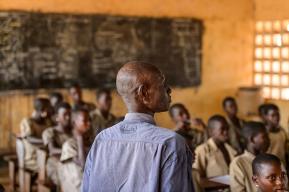Idea
Marisha Rasi-Koskinen, the rebellious pen

Anuliina Savolainen
UNESCO
What would you do if you came face to face with a younger version of yourself? This question is at the heart of Marisha Rasi-Koskinen’s youth novel The Dark Side of the Sun, where a teenage girl adventures in the mysterious waters of memory and existential questions hidden beneath the surface of an isolated mining town. As she travels through time, she encounters different versions of herself. A mesmerizing blend of coming-of-age story, dystopian tale, and sci-fi thriller, the book won the Finlandia Prize in Children's and Youth Literature in 2019. ”I would call it speculative fiction. There’s a distortion, our reality takes a turn for the unexpected,” the Finnish writer and psychologist says.
Born in Finland in 1975, Rasi-Koskinen is the author of seven books, two of which are novels for teenagers and young adults. To date, her work has been translated into Danish, French, Galician, Hungarian, Spanish and Lithuanian. Whether she's writing for adults or children, her novels focus on the ambiguity of memories and power dynamics in human relationships. A character is rarely just a child, a teenager or an adult; rather, identities oscillate between the past, the present and the future. Finding oneself, getting lost, and breaking out of the ordinary are other recurring themes.
The nonconformist youth
Since her early childhood Marisha Rasi-Koskinen has loved stories with such twists. She grew up in Viisarimäki, a tiny village in central Finland surrounded by forests and lakes. The nearby village library was like a second home to the young bookworm.
Marisha the teenager was “a punk and a contrarian” with self-made clothes, a biker jacket and green-striped, black-dyed hair. In upper secondary school she ticked “psychology” for the optional subject. A decisive choice that eventually led her to study social psychology at the University of Tampere in western Finland and to work as a school psychologist.
“When I graduated, I started working with children in families, first at a family counseling center and then as a school psychologist,” she tells us. During this busy time she also wrote her first novel and took care of her young children before becoming a full-time writer in 2019.
The time of availability
It’s now December 2023 and Marisha Rasi-Koskinen is in Paris for the promotion of the French translation of her 650-page novel REC (2020) that won another prestigious literary award, the Runeberg Prize, in 2021. The story revolves around the friendship between two teenagers, Lucas and Cole, in a world dominated by images and social media.
“In today's 'recording culture', kids are always available, reachable by parents or others, and they can be captured on screen at any time. The effect this continuous request for availability will have on their personalities will only be apparent in retrospect,” she muses.
In today's 'recording culture', kids can be captured on screen at any time
We can feel the psychologist's calm and reassuring presence in her posture, folded hands resting on lap. Yet her scarlet hair, the fact that she opts for vegan appetizers and her curiosity for everything in the margins remind us of the rebellious teenager. She says she still borrows stacks of books and likes to write in the public library, a place she sees as “a metaphor for the welfare state: anyone can go there, it costs nothing and is open to all”.
Her experience working as a psychologist – years of decoding emotions, detecting reasons behind learning difficulties, and listening to the concerns of children, teachers, and parents – how did this influence her writing? “Psychology, particularly social psychology, and writing are closely related for me. The realization of how we constantly create reality in our conversations, and how we have different identities and different ways of telling our story depending on whom we are speaking to, has brought a multi-perspective nature to my writing. There is always the perspective of the other behind every story.”
Bringing out the inner teenager
Rasi-Koskinen can write in a way that allows her works to contain a different story on the second reading. While fully embracing the complexity of her style, the author assures us that she is more indulgent when writing for the young. “I try to accompany them through the story and out, to be more plot-driven and rely more on the action. It is great fun! However, my YA books are not exactly easy – I write for people who already love to read,” she admits. As another proof that teenagers are not discouraged by her demanding stories, The Dark Side of the Sun won the Nuori Aleksis prize in 2020, awarded by a jury of teenage readers.
When she writes for the young, she gives the floor to the teenager in her. “I write with her, and she is also my implied reader. The adult me is there to support, but has no right to judge or give lessons to her,” she says.
“It’s good to have easy-reading books to instil a love of reading, but we also need more ambitious youth literature that introduces literary elements of adult books. When writing for the young, I don't think we should avoid any particular topics, but they do deserve books that take place in their world. So that you don’t have to read about relationship problems of fortysomethings when you’re fifteen,” she remarks.
Young people deserve books that take place in their world
Marisha Rasi-Koskinen's books are also a way of reconciling with the so-called “awkward age”, that fragile moment when all doors are open, at least in theory. “As much as we idealize our adolescent years, they are often also depicted as shameful and strange. Interestingly, many people wish to have children, but who wants to have a teenager? Where does this need to be negative about the young people we once were emerge from?” she wonders.
So, if she could travel in time, how would the teenage version of Marisha see her older self today, surrounded by Parisian journalists and being filmed by her French publisher for a promotional video? Marisha Rasi-Koskinen bursts into laughter. “I'd like to think she’d be relieved if she saw this future: ‘that person isn't such a dumbhead after all’.”






